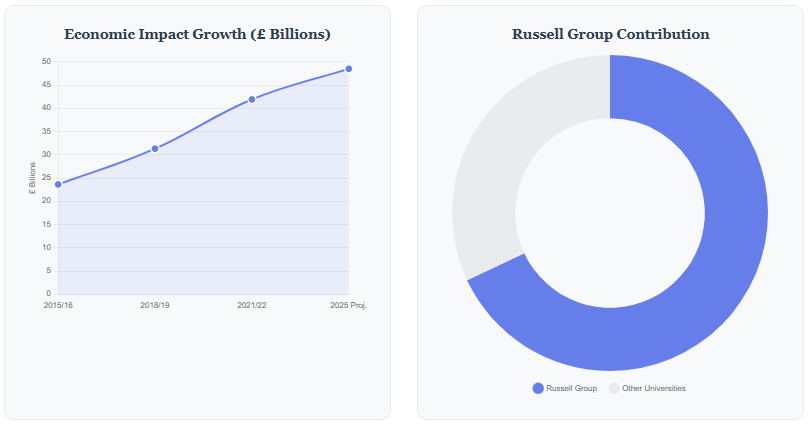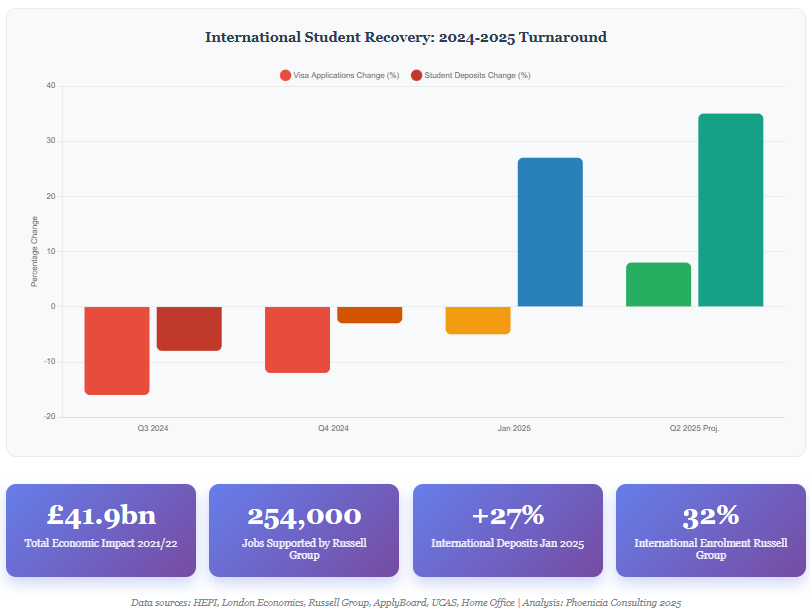UK University International Partnerships: Recovery and Strategic Realignment in 2024-2025
Bottom Line Up Front: After a challenging 2024 marked by policy uncertainty and declining international enrolments, UK universities are positioned for strategic recovery in 2025, with early indicators showing renewed international interest and partnerships becoming more crucial than ever for institutional sustainability. The UK higher education sector, worth over £265 billion to the national economy, faces a critical juncture in its international partnership strategy. Despite a 12% decline in international student visa applications in 2024, early data from January 2025 intake reveals a 27% increase in international student deposits and 31% rise in firm acceptances, suggesting a significant rebound in international confidence.
5/29/20253 min read
The Partnership Imperative: Economic Impact and Strategic Necessity
UK universities' reliance on international partnerships has never been more strategically vital. International students contributed £41.9 billion to the UK economy in 2021/22, representing a 34% increase from £31.3 billion in 2018/19. Even accounting for public service costs of £4.4 billion, the net economic benefit stands at £37.4 billion—equivalent to £58 million per parliamentary constituency or approximately £560 per UK citizen.
Russell Group Leadership in Partnership Development
The 24 Russell Group universities attract over 32% international student enrolment and conduct 68% of the UK's world-leading research. These institutions demonstrate the partnership model's effectiveness:
Support 254,000 jobs across the UK—twice the number in chemical and pharmaceutical manufacturing industries combined
Generate £25.31 billion annual income (2023/24), with £5.67 billion from research grants and partnerships
Hold total endowment value of £6.66 billion and net assets of £41.08 billion


Market Dynamics: From Crisis to Opportunity
The 2024 Adjustment Period
The sector experienced significant headwinds in 2024, primarily due to policy changes affecting international partnerships:
Student visa applications fell 12% to 423,000 in 2024, with withdrawals increasing 127% to 6,600 applications
International undergraduate admissions were 17% lower in 2024 than in 2020
The Sunak government's restrictions on student dependents impacted key source markets, particularly Nigeria, Sri Lanka, Ghana, and India
Strategic Realignment and Recovery Indicators
However, 2025 presents renewed opportunity for partnership development:
Positive Market Signals:
January 2025 intake shows 27% increase in international deposits via Enroly platform and 14% rise in acceptance letters
UniQuest data reveals 31% increase in firm acceptances for January 2025 compared to 2024
UK ranked as second most attractive study destination in Fall 2024 ApplyBoard survey, ahead of Australia and Canada
Competitive Advantages:
Preservation of Graduate Route work opportunities whilst competitors impose restrictions
Labour government's "unambiguously welcoming" stance toward international students
International student caps in Canada and Australia create market opportunity for UK institutions


Partnership Evolution: Strategic Models and Innovation
Contemporary Partnership Frameworks
Leading UK universities are adopting sophisticated partnership models that extend beyond traditional recruitment:
Comprehensive Partnership Approach: INTO University Partnerships reports £2 billion annual economic impact through partnerships spanning three continents, supporting entire international student journey from recruitment to career outcomes
Innovation in Partnership Delivery:
AI-powered predictive insights to mitigate international student enrollment challenges
Global student recruitment networks enrolling more than 10,000 students annually through physical presence and online technologies
Enhanced career pathway programmes connecting international graduates with employers in home markets
Regional Partnership Patterns
Market Diversification Strategy:
Chinese students account for nearly 25% of international undergraduate approvals but experienced 10% decline from 2022-2024
Growth markets include Ireland, UAE, Singapore, and Canada reaching all-time highs in 2024
Nepal emerged as notable exception with 61% increase in applications despite policy restrictions
Future-Proofing Partnership Strategy
Institutional Resilience Through Diversification
Universities must develop robust partnership portfolios to mitigate single-market dependency risks. The sector's over-reliance on Chinese students—whilst providing stability—creates vulnerability to geopolitical and economic shifts.
Strategic Recommendations:
Geographic Diversification: Develop partnerships across multiple regions to reduce dependency on single markets
Value-Added Partnerships: Focus on comprehensive collaborations that extend beyond student recruitment to research, curriculum development, and industry connections
Technology Integration: Leverage AI and digital platforms for partnership management and student experience enhancement
Policy Resilience: Build partnerships that can adapt to changing immigration and education policies
Long-term Sustainability Model
With UK 18-year-old demographics peaking in 2030 and application rates declining to 41.9% in 2024, international partnerships become critical for sector sustainability. Universities that fail to develop robust international partnerships face significant challenges post-2030 when domestic student numbers plateau.
Conclusion: Strategic Imperative for Partnership Excellence
The UK higher education sector stands at a pivotal moment. Despite 2024's challenges, early 2025 indicators suggest renewed international confidence in UK universities. Institutions that strategically develop comprehensive, diversified international partnerships—extending beyond traditional recruitment to encompass research collaboration, industry connections, and career outcomes—will emerge stronger and more resilient.
The partnership dividend extends far beyond individual institutions: Russell Group analysis demonstrates that investing in research and innovation through international partnerships creates hundreds of thousands of jobs and supports enterprise development across every UK region.
For university leaders and boards, the message is clear: international partnerships are not merely an internationalisation strategy—they are fundamental to institutional sustainability, economic contribution, and competitive positioning in an increasingly complex global education landscape.
The opportunity is significant, but the window for strategic action is finite. Universities that act decisively on partnership development in 2025 will define the sector's trajectory for the next decade.
Research conducted May 2025 | Data sources: HEPI, UCAS, Home Office, London Economics, Russell Group, ApplyBoard, INTO University Partnerships
